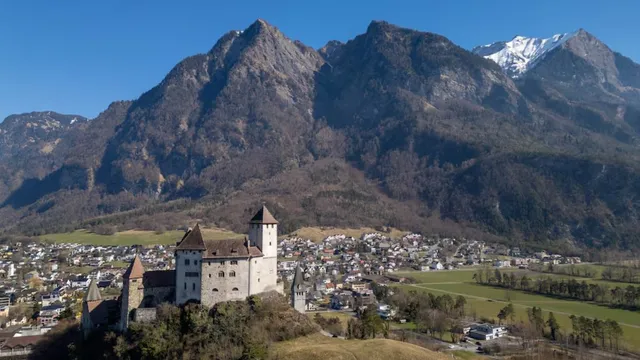- By Supratik Das
- Sun, 27 Jul 2025 01:49 PM (IST)
- Source:JND
Interesting facts from around the world: Imagine residing in a nation with no airport, no national currency, and no native language, yet the standard of living is so high that many residents never need to work a day in their lives. Welcome to Liechtenstein, Europe's unheralded but incredibly rich microstate tucked in the Alps. Hidden in a picturesque valley between Austria and Switzerland, the small Principality of Liechtenstein frequently goes unnoticed on the world map. But in terms of richness, stability, and lifestyle, it makes up for its lack of space. With only 40,000 residents, this landlocked country has a crime rate so minimal that it doesn't really require police, no foreign debt, and a per capita gross domestic product that tops even most of the oil-producing countries.
It adopts the Swiss Franc rather than issuing its own, and German is its official language, even though it is not distinctly Liechtensteinian. Still, the nation has established itself as a world center for precision industries and high-end banking, yet it remains one of the most highly developed standards of living on the planet. A recent viral video on social media has thrown a spotlight on this underappreciated Alpine gem, sparking fascination with its storybook landscapes, old-world castles, and near-utopian lifestyle.
No Airport, No Currency Of Its Own
Liechtenstein does not have an international airport. Visitors need to travel by air into Zurich, Switzerland, or Innsbruck, Austria, before arriving in the country by road. However, this has not deterred Liechtenstein from emerging as a center for high-value sectors and private banking. Being strategically positioned in the middle of Europe and having a solid infrastructure guarantees easy reach and international business accessibility. The nation also does not have its own currency. It officially operates on the Swiss Franc (CHF), emphasising its strong economic links with Switzerland. The official language is German, which is widely spoken but not uniquely Liechtensteinian.
Recommended For You
Though small, only 160 square kilometers, about the size of Washington, D.C., Liechtenstein is Europe's second-wealthiest country by per capita income after Monaco. Based on economic statistics, the per capita income is approximately USD 197,000 annually, much greater than almost every other nation in the world. Maybe even more surprising, though, is its close-to-zero crime rate. According to the most recent official statistics, just seven individuals are imprisoned throughout the whole nation. Citizens frequently don't lock their homes, and the police department consists of about 100 officers for the whole nation. This public safety, combined with economic freedom, has resulted in many citizens retiring early or spending their days purely on hobbies and passion work. Similar to many wealthy societies, showing wealth openly is in poor taste here. The society is founded on mutual respect, privacy, and tacit prosperity.
Strong Democratic Traditions And Efficient Governance
Liechtenstein has a parliamentary constitutional monarchy with a combination of royal rule and democracy. According to its 1921 constitution, the executive is divided between the governing prince and an elected parliament. It has a five-member government cabinet, which is nominated by the parliament and appointed by the prince for four-year terms.
ALSO READ:Did You Know: This Country Just Announced Rs 2 Lakh Crore Giveaway For Citizens?
Despite having just 1,500 civil servants, fewer than 4 per cent of the population, the government is slim and streamlined. This is much lower than the European Union average rate of 17 per cent. The 25-member parliament also holds office for four years, promoting continuity of democratic processes and financial discipline. Liechtenstein's economic pillar is powered by two main sectors, advanced manufacturing and financial services. The industrial sector that involves machine tools, dental technology, as well as precision engineering adds up to 42 per cent of the country's gross value added, significantly higher than the EU average of 15 per cent. The financial sector, comprising private banking, wealth management, insurance, and trust services, accounts for approximately 20 per cent of the GDP. Liechtenstein's financial institutions and banks are under the EEA regime, which provides them with full access to the single market in the EU as well as regulation by the European Banking Authority. Liechtenstein is also supported by strong bilateral relations with Switzerland, including a monetary and customs union as well as mutual close coordination of labor, taxation, and infrastructure.
A Workforce Larger Than Its Population
One of Liechtenstein's most notable economic indicators is that the number of workers in the country exceeds its population. In 2022, the working population was 42,500, and the population was just over 40,000. Around 56 per cent of the working population commute each day from Switzerland, 37 per cent from Austria, and a smaller percentage from Germany. At a labor participation rate of 76.1 per cent and an unemployment rate of less than 2 per cent, the principality is in a situation of full employment with a stable economy.
ALSO READ: Did You Know: Flushing After 10 PM Could Get You Fined In This Country
The viral Liechtenstein video that brought about renewed interest in the country elicited thousands of reactions from world netizens who, in numerous posts, called the country a "dreamland." Comments were flooding in, admiring its peaceful beauty, clean politics, and low crime. "Such is the life everywhere it should be," replied one user. Another posted, "I wish my nation to become like this, no crime, honest citizens, and sufficient wealth to not worry." Tourists who have visited the nation also weighed in. "We drove in from Geneva, and I can't begin to express how beautiful it was. It was like entering a fairytale," posted one tourist.
Despite being tiny, Liechtenstein demonstrates that a nation doesn't need to have huge land, army strength, and global hegemony to thrive. With economic unification, a disciplined regime, an industry driven by innovation, and a culture of trust, this Alpine miniature is an inspiring case study for nations aspiring to sustainable progress and people's happiness. As the world continues to awe at its unassuming triumph, Liechtenstein stands out, tiny in size but colossal in every other aspect.






